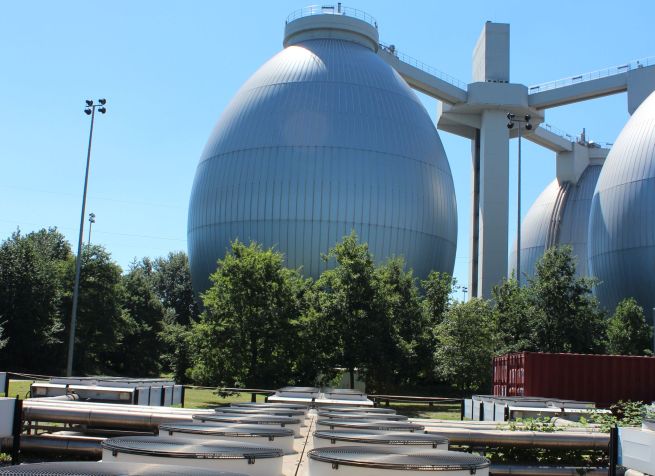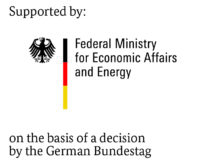Plant optimization for alternative use of biogases targeted
19 October 2020 – The production of high-purity methanol from sewage gas as a marketable product is the objective of a current research project. The Research Institute for Water and Waste Management at the RWTH Aachen University (FiW) e. V. and the OWI Science for Fuels gGmbH project to build a demonstrator for an optimized methanol synthesis process. The basis of the plant is an existing methanol synthesis plant of the FiW at the Emschermündung wastewater treatment plant. In addition, they are developing a closed plant concept that allows an economic scaling of the plant size and thus has the potential for future marketing to biogas producers.

Fermenter in the sewage plant Emschermündung. Photo: FiW
Many wastewater treatment plants, but also agriculture, have long been engaged in well-researched production of biogas from organic residues of wastewater treatment processes. Depending on the location, the gas produced in this way can be used both for direct electricity and heat generation at the plant itself and for marketing. This is for example of interest for operators of combined heat and power plants (CHP). A large part of CHP-Operators receive funding under one of the early renewable energy laws (EEG) due to the biogenic fuel. In the course of the next few years, both this funding scheme will expire for many of the older biogas plants and the demands on the operators will increase, which in many cases will make their operation uneconomical. Therefore, operators of biogas plants need economic alternatives that allows a high-quality use of sewage and biogas. An example for this could be the synthesis of methanol, which becomes a liquid storage medium for renewable gases. Methanol has good chances of being marketed as an energy source and a basic product for the chemical industry.
Based on many years of experience in research, design and construction of reforming processes, OWI is dealing with the renewal of the biogas reformer in this research project. The aim is to replace the existing plant component by a reformer which promises a significantly higher efficiency and reduces the usage of gas for the generation of the required process heat.
As the developer and first operator of the plant, FiW is dedicated to redesign the synthesis process, including improved reformation. The fundamental redesign of the synthesis process includes the integration of an additional hydrogen source. This serves two purposes. On the one hand, it can compensate for a systemic hydrogen deficit in the synthesis process. On the other hand, it enables scaled plants to be integrated into the control energy market. Against the background of an increasingly volatile electricity market, this contributes to the stabilization and economic efficiency of the plant concept.
Furthermore, FiW is striving for a complete renewal of the reactors. For this purpose, the reactor and catalyst material must be matched to each other in a flow-optimized manner. This extends the operating range of the plant and increases the methanol yield of the system.
The distillation of the product at the end of the synthesis process guarantees the purity of the methanol and ensures the integration of the plant concept into the existing methanol infrastructure. This contributes significantly to the economic efficiency of corresponding plants and the technological maturity of the plant concept.
The research and development project with the funding code 49VF190058 is funded as part of the INNO-KOM program by the Federal Ministry of Economics and Energy based on a resolution of the German Bundestag.







